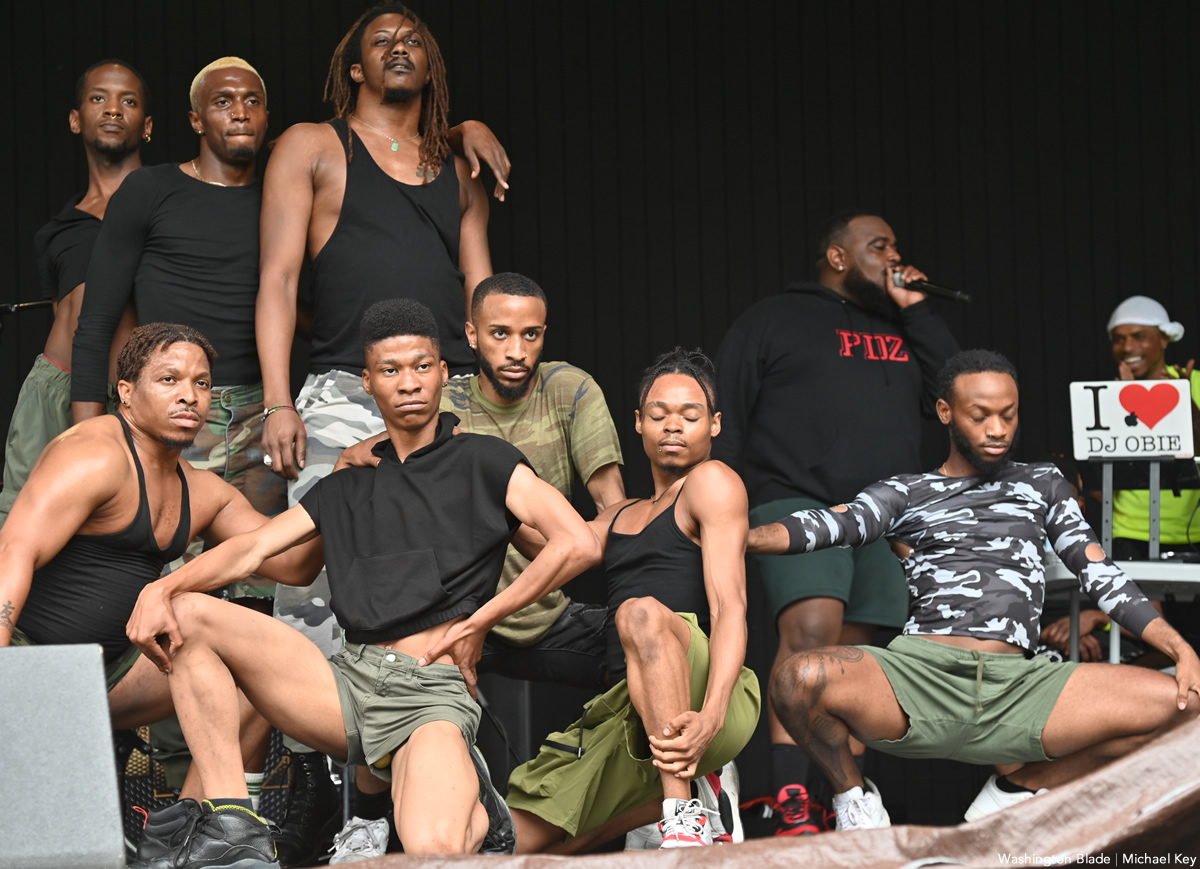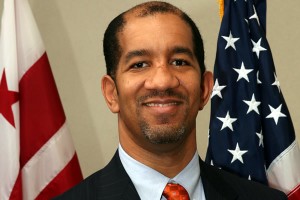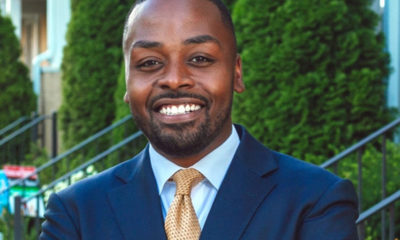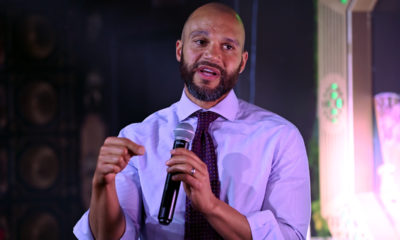Local
Biddle beats out Vincent Orange for interim post
Ward 4 school board member Sekou Biddle, who won an interim appointment to the D.C. City Council last week, says he’s a strong supporter of LGBT rights, including same-sex marriage.
Biddle, 39, beat former City Council member Vincent Orange (D-Ward 5) and four other Democratic candidates who competed for the interim appointment before the 80-member D.C. Democratic State Committee, which makes interim Counsel appointments.
“I support same-sex marriage,” Biddle told the Blade after the vote. “I think it’s an indication of the kind of city that we have. It’s what makes us, in my opinion, a top-flight, world-class city that we have that level of respect for human and civil rights.”
Biddle will face off against Orange and other candidates expected to enter the race from all political parties in a special citywide election scheduled for April 26.
He was expected to take office immediately in his temporary Council appointment for a seat made vacant after Council member Kwame Brown (D-At-Large) won election as City Council Chairman.
Before getting elected to the school board, Biddle began his career as a classroom teacher for eight years. He later served in leadership positions in education advocacy organizations, including his current post as executive director of the group Jumpstart.
Last week’s vote by the State Committee came after each of the candidates spoke before the committee and an overflowing crowd that gathered in a meeting room at the Democratic National Committee headquarters on Capitol Hill.
The Gertrude Stein Democratic Club, the city’s largest LGBT political group, endorsed Biddle in his race for the school board, where he has served since 2007.
Three Stein Club members who also are members of the D.C. Democratic State Committee endorsed and campaigned for Biddle in his quest for the committee’s appointment. The three are Jeffrey Richardson, the Stein Club president; Lateefah Williams, the club’s vice president for legislation and political affairs; and Alexandra Beninda, the club treasurer.
He also received the endorsement of Brown, who beat Orange in the hotly contested race in November for the Council chair race. At least three other Council members – Mary Cheh (D-Ward 3), Harry Thomas (D-Ward 5), and Marion Barry (D-Ward 8) also endorsed Biddle.
Mayor Vincent Gray remained neutral in the contest but some of his top political operatives backed Biddle. This prompted many political observers to conclude that the city’s political establishment had shifted its support from Orange – who was considered the frontrunner just two weeks ago – to Biddle.
Orange came out strongly against same-sex marriage during his unsuccessful race for mayor in 2006. When he ran against Brown for the Council chair seat last year he announced he had changed his position to support the city’s same-sex marriage law. But he was less clear about whether he would support or oppose holding a voter initiative seeking to overturn the marriage equality law, which took effect last March.
It took three rounds of voting for Biddle to nail down his victory over Orange Thursday night. With 74 of the 80 State Committee members present to vote, Biddle won on the third round by a vote of 40 to 31. Three ballots cast by committee members were disqualified because they voted for one of the other candidates that were eliminated after the first round of voting.
Only Biddle, Orange and candidate Stanley Mayes, a Ward 1 political activist, received any votes in the six-candidate race.
Many of the observers at the State Committee meeting were looking toward gay Council member David Catania (I-At-Large) as a possible predictor of what might happen in the April special election.
Catania stunned the city’s political establishment in 1997 when, running as a Republican, he defeated Democratic frontrunner Arrington Dixon in a special election to win his at-large Council seat.
Just 7 percent of the city’s registered voters turned out for the special election. But gays and Republican voters turned out in force, giving Catania his margin of victory over Dixon, a former City Council chairman who some observers said was overly complacent in his campaign.
Catania won re-election to a full term the following year and has retained his seat since that time. He withdrew from the Republican Party in 2004 to become an independent after the GOP and President George W. Bush embraced a constitutional amendment to ban same-sex marriage.
Some local political pundits say pro-gay Republican Patrick Mara, who won election in November to the school board from Ward 1, could be the next “Catania” in the April special election. With a low voter turnout and support from Republicans and gays, among other groups, Mara supporters say he has a shot at winning. He has yet to announce whether he plans to run, although insiders believe he will enter the race.
Catania unofficially backed Mara when Mara ran against and defeated former Republican Council member Carol Schwartz two years ago in the Republican primary. Mara lost the general election to Democrat turned independent Michael Brown in the general election. As a friend of Mara’s, some observers are wondering if Catania will throw his support and political organization behind Mara, with the possibility of Mara coming out ahead if Biddle and Orange split the Democratic vote.
Some gays, including David Mariner, executive director of the D.C. LGBT community center, backed Orange in last year’s council chair race, saying Orange has come around to support LGBT issues and was more qualified as an attorney and accountant to address the city’s budget and economic development issues. Mariner said he has yet to decide whom to support in the April special election.
Ben Young, a spokesperson for Catania, said Catania has no comment at the present time on the upcoming Council special election and the potential candidates that might run in the race.
Richardson of the Stein Club said the comparison between Catania and Mara would not likely apply in this year’s special election because Biddle is expected to run a vigorous campaign and line up support from large numbers of gay voters.
Like Biddle, Mara supports same-sex marriage and has expressed strong support for all other LGBT-related issues.
Biddle told the Blade that his political ties to the LGBT community are strong.
“In terms of politics and endorsements, I got my start in the LGBT community,” he said. “When I ran in 2007 for the Board of Education, the Stein Club was the first one to endorse me, and that gave my candidacy a lot of momentum and visibility. I’ve built a solid relationship since I’ve been in office and I think a level of trust.”
He said he considers himself a “progressive” on a wide range of city issues and hopes to draw support from all sections of the city.
District of Columbia
New D.C. LGBTQ+ bar Crush set to open April 19
An ‘all-inclusive entertainment haven,’ with dance floor, roof deck

D.C.’s newest LGBTQ+ bar called Crush is scheduled to open for business at 4 p.m. on Friday, April 19, in a spacious, two-story building with a dance floor and roof deck at 2007 14th St., N.W. in one of the city’s bustling nightlife areas.
A statement released by co-owners Stephen Rutgers and Mark Rutstein earlier this year says the new bar will provide an atmosphere that blends “nostalgia with contemporary nightlife” in a building that was home to a popular music store and radio supply shop.
Rutgers said the opening comes one day after Crush received final approval of its liquor license that was transferred from the Owl Room, a bar that operated in the same building before closing Dec. 31 of last year. The official opening also comes three days after Crush hosted a pre-opening reception for family, friends, and community members on Tuesday, April 16.
Among those attending, Rutgers said, were officials with several prominent local LGBTQ organizations, including officials with the DC Center for the LGBTQ Community, which is located across the street from Crush in the city’s Reeves Center municipal building. Also attending were Japer Bowles, director of the Mayor’s Office of LGBTQ Affairs, and Salah Czapary, director of the Mayor’s Office of Nightlife and Culture.
Rutgers said Crush plans to hold a grand opening event in a few weeks after he, Rutstein and the bar’s employees become settled into their newly opened operations.
“Step into a venue where inclusivity isn’t just a promise but a vibrant reality,” a statement posted on the Crush website says. “Imagine an all-inclusive entertainment haven where diversity isn’t just celebrated, it’s embraced as the very heartbeat of our venue,” the statement says. “Welcome to a place where love knows no bounds, and the only color or preference that matters is the vibrant tapestry of humanity itself. Welcome to Crush.”
The website says Crush will be open Tuesdays and Wednesdays from 4 p.m. to 12 a.m., Thursdays from 4 p.m. to 2 a.m., Fridays from 4 p.m. to 3 a.m., Saturdays from 2 p.m. to 3 a.m., and Sundays from 2 p.m. to 12 a.m. It will be closed on Mondays.
Crush is located less than two blocks from the U Street Metro station.
District of Columbia
Reenactment of first gay rights picket at White House draws interest of tourists
LGBTQ activists carry signs from historic 1965 protest

About 30 LGBTQ activists formed a circular picket line in front of the White House Wednesday afternoon, April 17, carrying signs calling for an end to discrimination against “homosexuals” in a reenactment of the first gay rights protest at the White House that took place 59 years earlier on April 17, 1965.
Crowds of tourists looked on with interest as the activists walked back and forth in silence in front of the White House fence on Pennsylvania Avenue. Like the 1965 event, several of the men were dressed in suits and ties and the women in dresses in keeping with a 1960s era dress code policy for protests of the Mattachine Society of Washington, D.C., the city’s first gay rights group that organized the 1965 event.
Wednesday’s reenactment was organized by D.C.’s Rainbow History Project, which made it clear that the event was not intended as a protest against President Joe Biden and his administration, which the group praised as a strong supporter of LGBTQ rights.
“I think this was an amazing event,” said Vincent Slatt, the Rainbow History Project official who led efforts to put on the event. “We had twice as many that we had hoped for that came today,” he said.
“It was so great to see a reenactment and so great to see how far we’ve come,” Slatt said. “And also, the acknowledgement of what else we still need to do.”
Slatt said participants in the event who were not carrying picket signs handed out literature explaining the purpose of the event.
A flier handed out by participants noted that among the demands of the protesters at the 1965 event were to end the ban on homosexuals from working in the federal government, an end to the ban on gays serving in the military, an end to the denial of security clearances for gays, and an end of the government’s refusal to meet with the LGBTQ community.
“The other thing that I think is really, really moving is some of the gay staff inside the White House found out this was happening and came out to greet us,” Slatt said. He noted that this highlighted how much has changed since 1965, when then President Lyndon Johnson’s White House refused to respond to a letter sent to Johnson from the Mattachine Society explaining its grievances.
“So now to have gay people in the White House coming out to give us their respects and to say hello was especially meaningful to us,” Slatt said. “That was not expected today.”
Among those walking the picket line was longtime D.C. LGBTQ rights advocate Paul Kuntzler, who is the only known surviving person who was among the White House picketers at the April 1965 event. Kuntzler said he proudly carried a newly printed version of the sign at Wednesday’s reenactment event that he carried during the 1965 protest. It stated, “Fifteen Million Homosexuals Protest Federal Treatment.”
Also participating in the event was Japer Bowles, director of D.C. Mayor Muriel Bowser’s Office of LGBTQ Affairs. Bowles presented Slatt with a proclamation issued by Bowser declaring April 17, 2024, Mattachine Society Day in Washington, D.C.
“Whereas, on April 17, 1965, the Mattachine Society of Washington courageously held the nation’s inaugural picket for gay rights, a seminal moment in the ongoing struggle for LGBTQIA+ equality in the United States, marking the genesis of public demonstrations advocating for those rights and paving the way for Pride Marches and Pride celebrations worldwide,” the proclamation states.
About 30 minutes after the reenactment event began, uniformed Secret Service agents informed Slatt that due to a security issue the picketers would have to move off the sidewalk in front of the White House and resume the picketing across the street on the sidewalk in front of Lafayette Park. When asked by the Washington Blade what the security issue was about, one of the Secret Service officers said he did not have any further details other than that his superiors informed him that the White House sidewalk would have to be temporarily cleared of all people.
Participants in the event quickly resumed their picket line on the sidewalk in front of Lafayette Park for another 30 minutes or so in keeping with the 1965 picketing event, which lasted for one hour, from 4:20 p.m. to 5:20 p.m., according to Rainbow History Project’s research into the 1965 event.
Although the LGBTQ picketers continued their procession in silence, a separate protest in Lafayette Park a short distance from the LGBTQ picketers included speakers shouting through amplified speakers. The protest was against the government of Saudi Arabia and organized by a Muslim group called Al Baqee Organization.
A statement released by the Rainbow History Project says the reenactment event, among other things, was a tribute to D.C.-area lesbian rights advocate Lilli Vincenz, who participated in the 1965 White House picketing, and D.C. gay rights pioneer Frank Kameny, who founded the Mattachine Society of Washington in the early 1960s and was the lead organizer of the 1965 White House protest. Kameny died in 2011 and Vincenz died in 2023.
The picket signs carried by participants in the reenactment event, which were reproduced from the 1965 event, had these messages:
• “DISCRIMINATION Against Homosexuals is as immoral as Discrimination Against Negroes and Jews;”
• “Government Should Combat Prejudice NOT PROMOTE IT”
• “White House Refuses Replies to Our Letters, AFRAID OF US?
• “HOMOSEXUALS Died for their Country, Too”
• “First Class Citizenship for HOMOSEXUALS”
• “Sexual Preference is Irrelevant to Employment”
• “Fifteen Million U.S. Homosexuals Protest Federal Treatment”
District of Columbia
Organizers announce details for D.C. Black Pride 2024
Most events to take place Memorial Day weekend at Westin Downtown

The Center for Black Equity, the organizer of D.C. Black Pride, the nation’s first and one of the largest annual African-American LGBTQ Pride celebrations, announced this year’s event will take place Memorial Day Weekend from May 24-27.
The announcement, released April 16, says that most 2024 D.C. Black Pride events will take place at the Westin Washington, D.C. Downtown Hotel at 999 9th St, N.W.
“With the theme Black Pride Forever, the event promises a weekend filled with vibrant celebrations, empowering workshops, and a deep exploration of Black LGBTQIA+ history and culture,” the announcement says.
It says events will include as in past years a “Rainbow Row” vendor expo at the hotel featuring “organizations and vendors created for and by the LGBTQIA+ community” offering products and services “that celebrate Black excellence.”
According to the announcement, other events include a Health and Wellness Festival that will offer workshops, demonstrations, and activities focused on “holistic well-being;” a Mary Bowman Poetry Slam “showcasing the power and beauty of spoken word by Black LGBTQIA+ artists;” the Black Pride Through the Decades Party, that will celebrate the “rich history of the Black LGBTQIA+ movement;” and an Empowerment Through Knowledge series of workshops that “delve into various topics relevant to the Black LGBTQIA+ community.”
Also, as in past years, this year’s D.C. Black Pride will feature its “Opening Night Extravaganza” reception and party that will include entertainment and live performances.
The announcement notes that D.C.’s annual Black Pride celebration, started in 1991 as a one-day outdoor event at Howard University’s Banneker Field, has inspired annual Black LGBTQ Pride events across the United States and in Canada, United Kingdom, Brazil, Africa, and the Caribbean. More than 300,000 people attend Black LGBTQ Pride events each year worldwide, the announcement says.
Full details, including the official schedule of events, can be accessed at dcblackpride.org.
-

 Africa4 days ago
Africa4 days agoCongolese lawmaker introduces anti-homosexuality bill
-

 District of Columbia20 hours ago
District of Columbia20 hours agoReenactment of first gay rights picket at White House draws interest of tourists
-

 World4 days ago
World4 days agoOut in the World: LGBTQ news from Europe and Asia
-

 Arizona1 day ago
Arizona1 day agoAriz. governor vetoes anti-transgender, Ten Commandments bill











